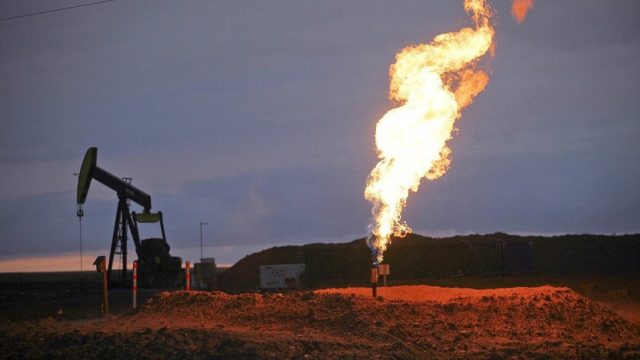"Byzantine" Federal Regulations Slowing North Dakota's Efforts To Fix Flaring

As oil production has boomed in North Dakota so has gas production. Gas in this state is a byproduct of oil development. Unfortunately, because the infrastructure to transport and process the gas hasn’t kept up with gas production, that’s lead to a lot of flaring, or the burn off of excess gas.
North Dakota’s Republican leadership has been working on fixing the flaring problem, and they seem to be on the right track. Last month flaring numbers hit a two-year low in the state, and the trend seems to be a downward one.
But their progress on addressing flaring is being slowed by forces beyond their control. Namely, byzantine federal regulations that make building pipelines and gas processing capacity a nightmare. Things are so bad, it appears as though state officials may fall short of hitting goals for reduced flaring:
Energy companies have been preparing since June for the deadline requiring them to capture 74 percent of natural gas extracted alongside crude oil from thousands of wells. The standards get tougher in January.
But the energy industry and state officials say they are bound to fall short of the goal through 2015, flaring gas in excess of targets and consequently having to trim oil production to comply with penalties built into the new standards..
The main reason, according to Reuters interviews and reviews of regulations, is simple: a Byzantine web of state and federal agencies who must sign off on new pipelines.
Too few pipelines and a lack of plant capacity to prepare gas for transport means North Dakota flares enough natural gas in one month to heat more than 160,000 homes for a year.
This is reminiscent of the quandary in Minnesota, where Democrat Governor Mark Dayton has demanded that North Dakota address oil-by-rail safety even as that state’s Public Utilities Commission sandbags the Sandpiper pipeline which would take nearly a quarter of North Dakota’s current daily oil production off fo the rails.
Environmentalists and other critics of fossil fuel energy cry foul over oil-by-rail “bomb trains” and the environmental impacts of flaring. But, in the name of environmentalism, the fixes for those problems are made almost impossible by bureaucratic red tape.
One almost gets the idea that some people don’t want us to develop fossil fuels at all.




